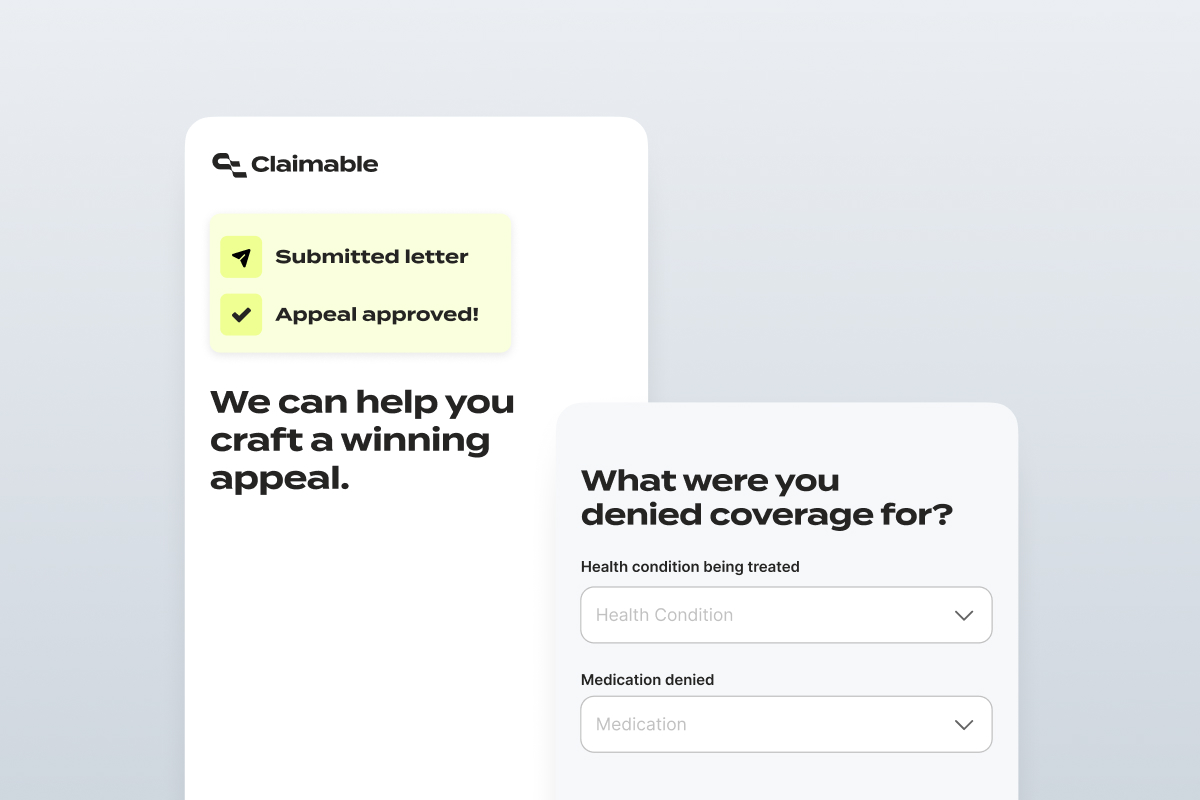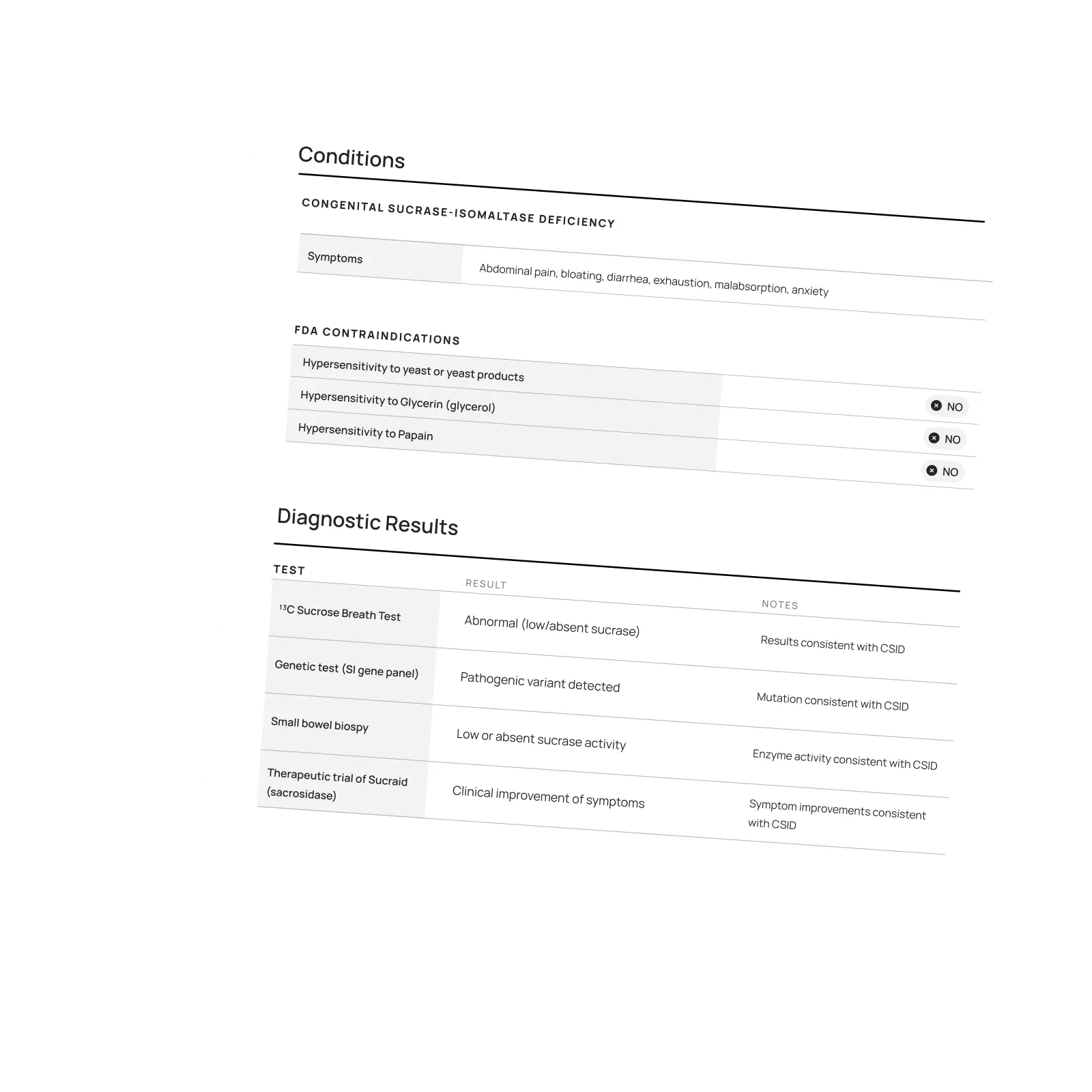Resources

Latest Posts

Your denied healthcare claims, handled. Introducing Claimable's AI-powered platform that helps patients challenge unjust denials with custom appeal in minutes.
At Claimable, we believe everyone is entitled to the care they need and coverage they deserve. Our physician-led team of healthcare insiders, data scientists and technologists is dedicated to fighting back against the 850 million denied U.S. health claims each year, challenging baseless denials and removing barriers to care, financial strain, and medical debt.
Introducing Claimable's AI-Powered Platform
Our AI-powered platform analyzes clinical research, policy details, appeals data and your unique medical story to generate and submit customized appeals in minutes.
"This platform is a lifeline for those caught in the machinery of an industry that too often prioritizes dollars over lives."
–Wendell Potter, health insurance reform expert and former insurance executive
Using Claimable is like having your very own team of AI-powered experts:
Analyzer
We extract relevant details from your documents and plan policies so you don’t have to, and transform them into compelling facts and powerful stories.
Researcher
We instantly search millions of clinical guidelines, appeal precedents, policy details and legal frameworks to find evidence that supports your claim.
Strategist
We gather, review, and apply learnings from winning appeals similar to yours, ensuring you have the strongest strategy possible.
Wordsmith
We create your appeal in minutes, using our proprietary algorithm to maximize the strength of arguments, evidence, tone, voice and style.
Assistant
We help you reach the right decision-makers by taking care of letter delivery and tracking, and offer guides, reminders and tips for following up.
Breaking down your winning appeal
Claimable is your secret weapon, blending advanced technology, insider knowledge, and a library of evidence to craft customized appeals that get results.
We pull information from three important categories to craft a comprehensive, compelling appeal.
Personal Impact
Your story matters. We summarize facts, events and the personal impact of denied care on your health, life and finances.
Clinical Evidence
We illustrate the clinical justification for care, pulling from medical studies, established guidelines, claims and appeals precedents.
Policy Compliance
We include plan policies and local laws relevant to your case, demanding insurers provide specific decision details and a fair, fast appeal review.
Getting started
Our appeal builder makes the process painless, we promise. Here's what to expect:
- Eligibility check - While we are working hard to support all types of care and conditions, we currently support autoimmune and migraine related denials within the last 180 days. As a first step, we will review your denial details and let you know If Claimable can help.
- Easy document upload - You’ll start by snapping a photo of your insurance information and denial notice. This helps us save you time and ensures we don’t miss anything. No documents, no problem – you can share details manually.
- Medical history questionnaire - We'll ask you a few simple questions about the events leading up to the denial. To prepare, be ready to share what alternative treatments you’ve tried in the past and why your doctor prescribed the treatment.
- Optional extras - In some cases, sharing a statement of medical necessity from your doctor or other documentation may strengthen or expedite your case. These aren’t required, and we’ll explain how to obtain extras if you don’t have them.
You can pick up where you left off anytime and your information will be saved.
Getting a fast and fair response
Once your appeal is created, we don’t stop there. We send your appeal by Fax and First Class Mail with tracking to make sure it’s received. We request urgent, 72-hour reviews when appropriate, and typically receive standard appeal decisions within a couple weeks. In addition, we hold insurers accountable to Affordable Care Act and ERISA regulations that mandate who reviews your appeal, what they share about their decision, when they share it and how they share it.
[TABLE]
Support when you need it
We provide guidance, reminders and tips to help you take action with confidence, and offer expert support when you need it.
- Reminders and tips - Throughout the process, we offer step-by-step guidance to capture your personal story, review your draft appeal, reach the right decision-makers and follow up with insurers.
- Knowledge resources - Get answers for commonly asked questions, understand your appeal rights and process, and decode confusing terms and codes.
- Support when you need it - Our appeals team is available when you have questions, want clarifications or need extra support. We respond to support needs within 1-3 business days via email and offer live support when needed.
Getting it all at a fair, flat and affordable price
We don’t take percentage-based fees because we believe getting access to the care you need and coverage you deserve shouldn’t cost you a fortune. Instead, Claimable’s AI-powered platform delivers a powerful, efficient, affordable appeals, without having to pay thousands for a lawyer or professional advocate.

In this article, we'll help you understand the role of your doctor when appealing a denied healthcare claim, and learn how best to work together–including 7 types of information to share.
If you find yourself confused and frustrated by insurance claims and denials, you are not alone. I’m a doctor and a patient with a chronic condition. I even worked at an insurance company for a while. With all that experience under my belt, I still find the rules and processes illogical and infuriating.
The most important thing to know is that you can appeal.
It’s your right!
In this article, we’re going to talk about the role of your doctor when appealing a denial, and how best to work together––including my top 7 topics to discuss.
Do I need to involve my doctor in my appeal?
You do not need your doctor’s involvement to appeal a denied healthcare claim. There’s no set playbook and it’s unlikely your doctor is an expert (they don’t teach these things in medical school). If and how you involve your doctor is a personal choice.
It’s important to know that appealing directly can be very effective. Many doctors don’t know this is an option, and don’t advise their patients to appeal as a result. .
So what can your doctor do?
Unsurprisingly, there isn’t one simple path for your doctor to take. If your doctor's office has a lot of support staff, they may call the insurer for you and try to iron out the problem. The insurer may have your doctor speak to one of their doctors. This is something called a peer-to-peer review (though these calls can be tough to coordinate with limited peer availability for certain specialties).
Instead, your doctor might suggest you try another treatment or enroll in a Patient Assistance Program.
Discuss the trade-offs of different treatment options in terms of benefits, risks, time and costs.
7 denial topics to discuss with your doctor
The insurer might need more information to determine if the drug is appropriate or cost-effective. Below is a list of 7 items to arm your doctor with:
#1 - Symptoms
Track the frequency and severity, and share your notes with your doctor. It’s helpful to have everything formally documented in your medical records.
#2 - Impact
Explain the impact on your daily life if care is denied. For example, an inability to drive, perform your job as expected, or care for a loved one.
#3 - History
Many insurers have specific rules around what has to be tried before they will pay for certain medications. Make sure your doctor documents all other medications and treatments you’ve previously tried, and why they did not work for you.
#4 - Denial Reason
If you get a letter from the insurer, it might include a term like “denied for medical necessity,” “treatment is deemed experimental,” or “excluded benefit.” Or, perhaps you’ve concluded a trial period and need to report results to renew your medication. Knowing the reason for the denial allows your doctor to focus their conversation on the right issue.
#5 - Current Guidelines
Ask your doctor to double-check current guidelines and to document against them as much as possible. These are often the basis of the insurance company rules.
#6 - You Rights
You might need to tell your doctor that under the Affordable Care Act, your right to appeal is protected. An insurer must give you a good-faith reason as to why they denied your care.
#7 - Urgent Review
If your medical needs are urgent because you face severe harm to your physical health, you may qualify for the Insurer to review your case more rapidly - usually within 72 hours. Make sure your doctor is aware of this, if applicable.
Arming your doctor with these 7 types of information will help them advocate more effectively on your behalf.
If you’re appealing directly, your doctor can still help.
Getting a letter from your doctor stating the medical necessity and urgency of your care could help your case. This “Letter of Medical Necessity” doesn’t have to be long, but should include the condition that’s being treated, the treatment required, the reason it’s needed, and what happens if it isn’t received. It should be signed, dated, and included in your appeal.
Certain insurers may ask for seemingly random information from your doctor, such as the Tax ID number of the practice. In this case, reach out to your doctor and explain why you need this information. Your doctor wants you to get the care you need, and should gladly empower you to file an appeal.
I don’t know how to appeal. Where do I begin?
Appealing a denied healthcare claim can feel overwhelming, but don’t worry, Claimable makes it painless. Our AI-powered platform analyzes clinical research, policy details, appeals data, and your personal medical story to generate and submit customized appeals in minutes. Our Introducing, Claimable article has everything you need to know to get started. The same details you might provide to your doctor can serve as the basis for an impactful direct appeal.
Ultimately, the best advocate for your health is you.

Learn why your health insurance claim file is essential for appealing denied claims, how to request it, and what to look for when reviewing it to strengthen your case.
What is a Claim File?
A claim file contains all the documents and communications your health plan used to decide whether to approve or deny your claim. Most health plans are legally required to share this information. According to a ProPublica investigation, reviewing your claim file can help expose mistakes or misconduct by your health plan, which can make your future appeals stronger.
When Should I Request My Claim File?
You can request your claim file anytime after a denial, but we recommend doing so if your first appeal is unsuccessful. This way, you can avoid delays or extra paperwork that might interfere with a timely reconsideration. It's a smart move to have this information in hand if you need to take further steps.
Why are Claim Files Important?
Your claim file gives you insights into why your claim was denied and may reveal errors or inconsistencies that can help you in your next appeal.
Most health plans are required to provide your claim file within 30 days, so you can review it carefully.
How to Request Your Claim File
- Request Your Claim File
If you appealed through Claimable, don’t worry—we’ve already requested it as part of your appeal process. If not, you can use ProPublica's handy template to request it yourself. - Call to Follow Up
Call your insurance company’s member services team (the number’s on your insurance card) to make sure they’re processing your request. It never hurts to check in! - File a Complaint
If your insurer doesn’t provide your claim file within 30 days, it’s time to file a complaint with your state or federal regulatory agency. You’re entitled to this information.
How do I review my claim file?
Reviewing your claim file might seem daunting, but with the right checklist, you can spot important details.
Look for any missing documents or internal communications that could reveal mistakes or issues with how your claim was handled.
And remember—you can always share your claim file securely with us at Claimable if you want to participate in our ongoing research on denial issues. Just reach out at support@getclaimable.com, and we’ll send you a secure link.
Claim File Checklist
Here’s what you should look for when reviewing your file:
Does it cover the right time frame?
It should include documents leading up to, during and after your denial. If documents provided do not cover the time period stated in your claim file request–it’s incomplete.
Does it include call recordings, transcripts and call logs?
The file should contain all phone call recordings, transcripts and/or summary logs related to communications about your claims and/or denials. If you know you or your health provider called the health plan and don’t see it in the log–it’s incomplete.
Does it include email communications?
It should include emails relevant to the denial(s), including internal messages and communications with healthcare providers. If you know you or your health provider emailed the health plan and don’t see it in the file–it’s incomplete.
Does it include internal messages?
The file should include internal communications among health plan staff about the evaluation or discussion of the denial(s). If the internal reasons or evidence differ from the denial notice, you may have strong grounds to challenge the decision.
Does it include claim approval and/or denial letters?
The file should include all formal and informal notices sent to you or your healthcare provider, such as denial letters or explanation of benefits. If the denial reasons change, you may have strong grounds to challenge the decision.
Does it include prior authorization requests and responses?
The file should include documents related to requests for authorization and their subsequent approvals or denials. If it includes medical records that were subsequently re-requested or ignored, you may have strong grounds to challenge the decision.
Does it include internal memos or reports?
The file should include any written reports or memoranda related to the denial(s) that were sent by or received from health plan staff. Look for any inconsistencies between these communications and your denial.
Final Thoughts
Your claim file is a powerful tool—it can give you the information you need to fight back and strengthen your appeal. We know dealing with denials can be frustrating, but Claimable is here to help. Don't hesitate to reach out if you have questions or need guidance.
Featured stories
Download a winning sample appeal
Want to see what it takes to successfully overturn a health insurance denial? Download our sample appeal to learn how we build strong, evidence-based cases that get results.

///////////////////////////////////////////////////////////////////////
//////////////////////////////////////////////////////////////////////////
////////////////////////////////////////////////////////////////////
/////////////////////////////////////////////
Each month, I endure about eight major episodes, each one leaving me exhausted, unable to concentrate, and too unwell to take part in daily life.
The frequency and unpredictability of these symptoms have isolated me socially and limited my capacity to take part in activities most people take for granted.
///////////////////////////////////////////////////////////////////////
//////////////////////////////////////////////////////////////////////////
////////////////////////////////////////////////////////////////////
/////////////////////////////////////////////
Be the first to know
Get the latest updates on new tools, inspiring patient stories, expert appeal tips, and more—delivered to your inbox.
You're on the list!

One of our core principles is to help patients protect their rights and level the playing field with their insurance company. This includes rights to multiple appeals, fair reviews, decision rationale, exceptions when needed, and adequate network access, among others. For more, read our post on patients rights.
Claimable’s AI-powered platform analyzes millions of data points from clinical research, appeal precedents, policy details, and your personal medical story to generate a customized appeals in minutes. This personalized approach sets Claimable apart, combining proprietary and public data, advanced analysis and your unique circumstances to deliver fast, affordable, and successful results.
We currently support appeals for over 85 life-changing treatments. Denial reasons may vary from medical necessity to out of network, and we even cover special situation like appealing plans that won’t count your copay assistance towards your deductible (hint: those policies were banned at the federal level in 2023). That said, we are rapidly growing our list of supported conditions, treatments and reasons. You can quickly check eligibility and ask to be notified when your interest becomes available. It helps us know where to focus next 🙂
We think about appeal times in a few ways. First, many professional advocates and experienced patients spend 15, 30 or even 100 hours building an appeal–but with Claimable, this takes minutes. We automate the process of analyzing, researching, strategizing and wordsmithing appeals. Next, there is the process of figuring out where you will send it (hint: expand your reach beyond appeal departments), then printing, mailing and/or faxing your submission. We handle that, too. Finally, there is the time it takes to get a decision. We request urgent reviews when appropriate, and typically receive standard appeal decisions within a couple weeks.
Review periods are mandated by applicable laws, from 72 hours for urgent, 7 days for experimental, 30 days for upcoming and 60 days for received services. Our goal is to get a response as fast as possible, since most of our clients are experiencing long care delays or extreme pain and suffering.
Claims are denied for a variety of reasons, many of which blur definitions. We focus on helping people challenge denials by proving care is needed and meets clinical standards, in addition to addressing specific issues like experimental treatments, network adequacy, formulary or site of care preference exceptions. We don't support denials for administrative errors or missing information, as we think those are best handled by simply resubmitting the claim in partnership with your provider. That said, many of our most rewarding successes have been cases previously though 'unwinnable', with providers and patients who fought tirelessly for months without appropriate response or resolution.
A denial letter is a formal notice from your insurance company explaining why a claim was denied and how you can appeal the decision. Sometimes the notice is included within an Explanation of Benefits. It is a legal requirements; if you didn’t receive one, contact your insurance company.
A letter of medical necessity is a statement from your doctor justifying why a specific treatment is critical to your care and/or urgently needed. You can attach it to your patient appeal to strengthen your case, especially if you are requesting an urgent appeal or need to skip standard ‘step therapy’ requirements. That said, we don’t require them and are often successful without them.
A claim file contains all the documents and communications your health plan used to decide whether to approve or deny your claim. Most health plans are legally required to share this information upon request. According to a ProPublica investigation, reviewing your claim file can help expose mistakes or misconduct by your health plan, which can make your appeal stronger.
Your insurer is required by law to give you written information about how to appeal, including the name of the company that reviewed your claim and where to send your appeal. Your health insurer may work with other companies, such as Pharmacy Benefit Managers (PBMs), Third-Party Administrators (TPAs), or Specialty Pharmacies, to manage your claims. These companies might be responsible for denying your claim and handling the appeal process on behalf of your insurer.
If you don't win your first appeal– don't give up! Many people are successful on their 2nd, 3rd or even 4th try, and future appeals are reviewed by independent entities. That said, we wrote a whole guide to understanding your options, including escalating your appeal and seeking other assistance for covering costs, forgiving debt or even seeking legal or regulatory support.
While both denial rates and appeal success rates vary widely by the type of health plan, state, and insurance company, studies have shown more than 50% of people win their appeal–and we apply strategies to boost your chances of success. Claimable has an 80% appeal success rate. The biggest denial challenge is that most people never appeal–allowing unjust denials to control their healthcare options because they are unaware of their rights or lack the support needed to fight back. No one needs to fight alone–Claimable is here to help. We know first hand that many denials are based on errors, inconsistencies or auto-decisions, and have proven strategies for fighting back against this injustice.
Let’s get you covered.


